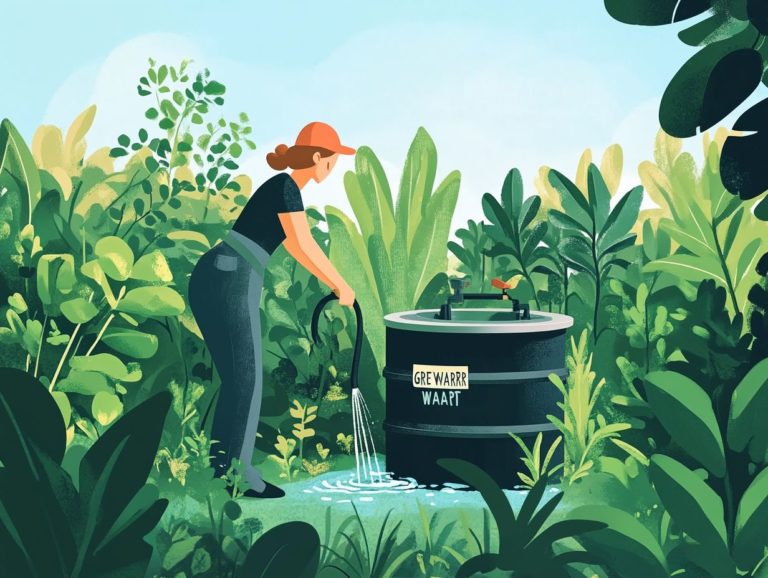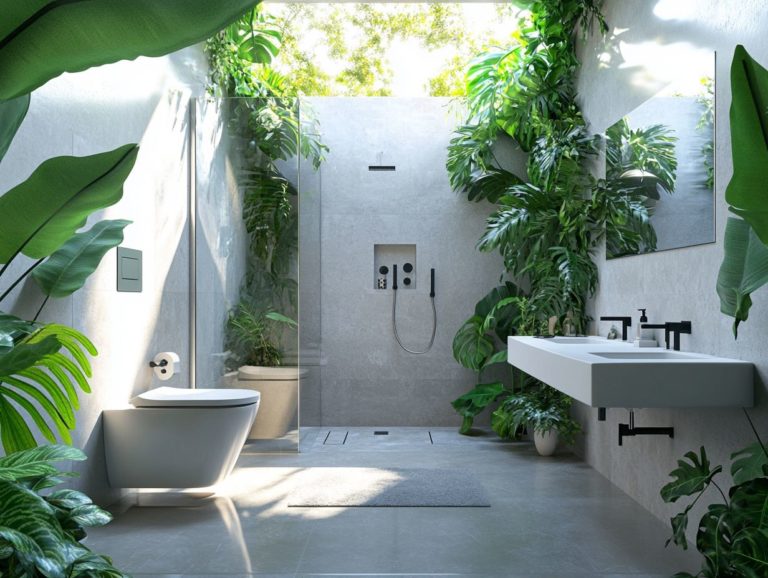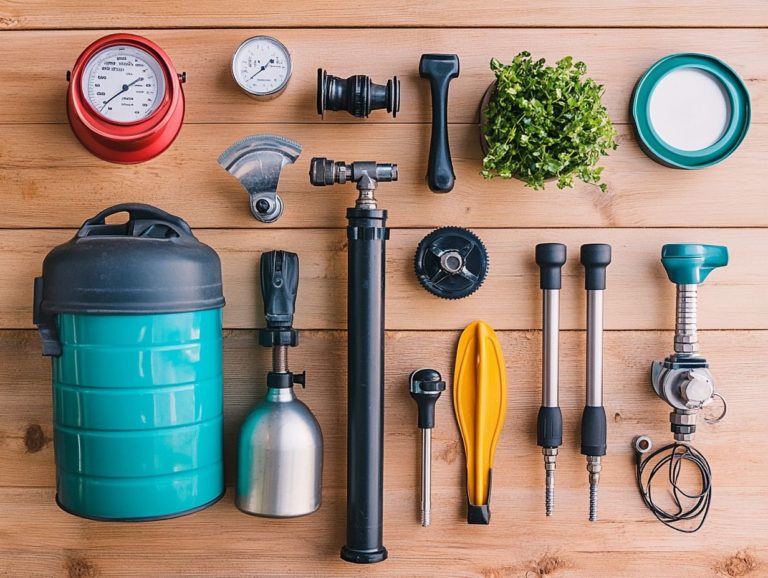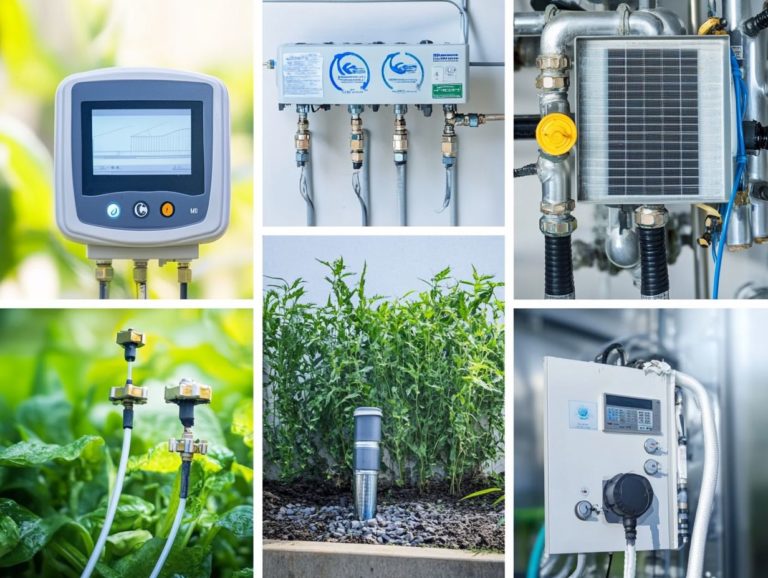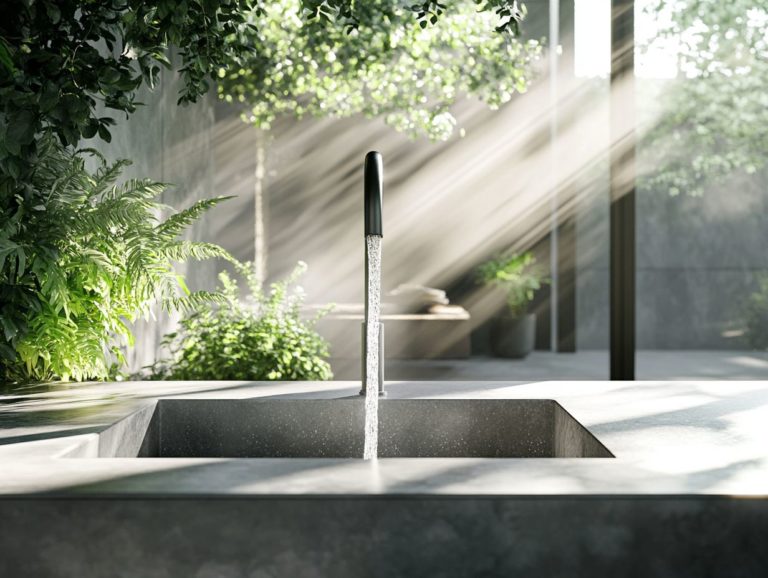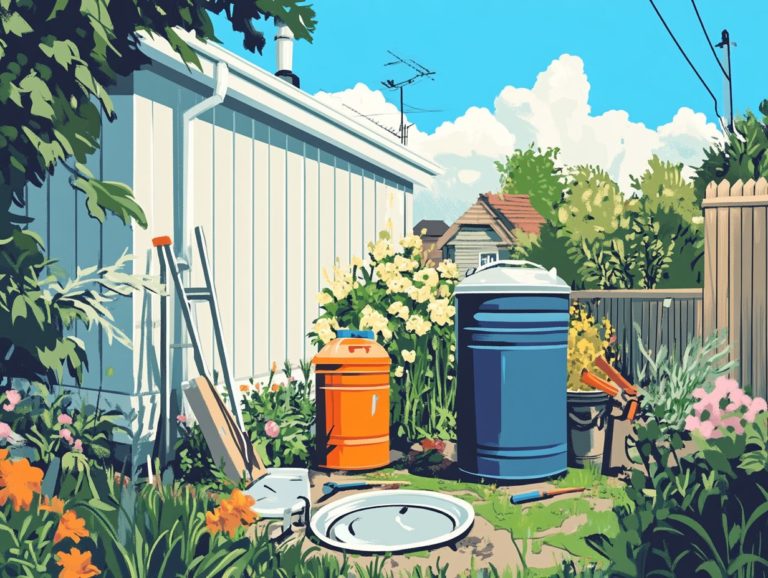5 Reasons to Invest in a Smart Irrigation System
In a time when water conservation and efficient resource management are paramount, smart irrigation systems emerge as an indispensable choice for homeowners and gardeners alike.
These systems offer more than mere plant hydration; they conserve water, lower your bills, and foster healthier growth.
This article delves into five compelling reasons to invest in a smart irrigation system, highlighting features such as customizable watering schedules and real-time soil monitoring. These systems benefit your garden and the environment.
Are you prepared to take your gardening to the next level? Let s explore!
Contents
- Key Takeaways:
- 1. Saves Water and Reduces Water Bills
- 2. Customizable and Efficient Watering Schedule
- 3. Remote Access and Control
- 4. Monitors Soil Moisture Levels
- 5. Integrates with Weather Data for Optimal Watering
- What Is a Smart Irrigation System and How Does It Work?
- What Are the Different Types of Smart Irrigation Systems?
- How Can a Smart Irrigation System Benefit the Environment?
- What Are the Initial Costs and Potential Savings of a Smart Irrigation System?
- How Can a Smart Irrigation System Help with Plant Health and Growth?
- What Are the Common Features of a Smart Irrigation System?
- Frequently Asked Questions
- What exactly is a smart irrigation system?
- What are the benefits of investing in a smart irrigation system?
- How does a smart irrigation system reduce water usage?
- Will investing in a smart irrigation system really save me money?
- Can I control a smart irrigation system from my phone?
- Is a smart irrigation system suitable for all types of landscapes?
Key Takeaways:
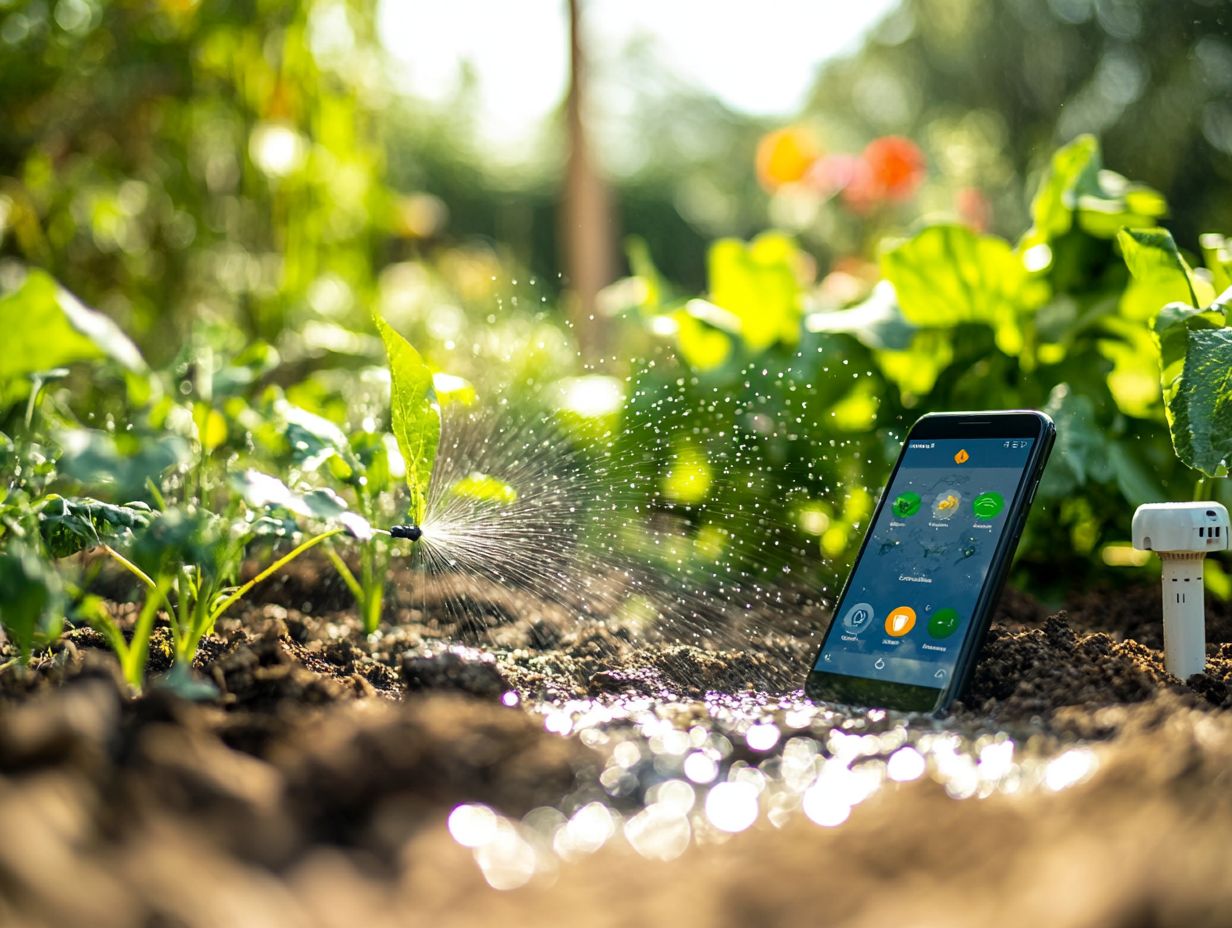
- Save water and cut costs with a smart irrigation system.
- Control your watering schedule easily with smart technology.
- Enjoy remote access and management for convenience and efficiency.
1. Saves Water and Reduces Water Bills
Implementing smart irrigation systems elevates your water conservation efforts while significantly reducing your water bills.
This choice is not only eco-friendly but also financially smart for both residential and commercial properties, aligning perfectly with sustainable practices.
These innovative systems use automated scheduling to water your plants at optimal times, ensuring moisture is delivered precisely when needed.
Equipped with sensors, they make real-time adjustments based on current weather conditions, drastically minimizing overwatering and runoff.
As a result, you can enjoy substantial long-term savings on your water bills, allowing for more effective resource allocation.
By conserving water, this technology contributes to the preservation of local ecosystems, easing the pressure on vital water supplies and promoting a healthier environment for both flora and fauna.
2. Customizable and Efficient Watering Schedule
One of the standout features of smart irrigation systems is their remarkable ability to create customizable and efficient watering schedules.
These schedules allow you to optimize your watering routine based on the specific needs of your plants and surrounding environmental conditions.
By integrating soil moisture sensors and real-time weather data, these systems dynamically adjust schedules, ensuring that watering occurs only when necessary.
For instance, if your landscape boasts a diverse assortment of plants, from drought-resistant succulents to lush ferns, this technology intelligently determines the precise amount of water each type requires.
This precision not only conserves water but also fosters healthier plants, minimizing the risks associated with overwatering or drought stress.
Whether tending to a sprawling commercial landscape or nurturing a compact urban garden, this intelligent approach enhances irrigation efficiency, seamlessly catering to varying soil types and local weather patterns.
3. Remote Access and Control
The emergence of smart irrigation technology has transformed how you approach landscape watering.
It offers remote access and control, allowing you to manage your irrigation systems conveniently from your mobile device, regardless of your location.
This innovative method enables you to fine-tune your watering schedules and practices with just a few taps on your smartphone or tablet.
You can effortlessly monitor a range of parameters, including water usage, soil moisture levels, and even plant health, all in real-time.
For your residential property, this means easy management of your gardens and lawns, leading to significant water savings and healthier landscapes.
On the commercial side, operators can optimize large-scale irrigation systems, ensuring efficient resource use while maintaining vibrant grounds, ultimately supporting sustainability goals.
With these advanced features, your landscapes can flourish, effortlessly adapting to environmental demands.
Ready to revolutionize your gardening? Invest in a smart irrigation system today!
4. Monitors Soil Moisture Levels
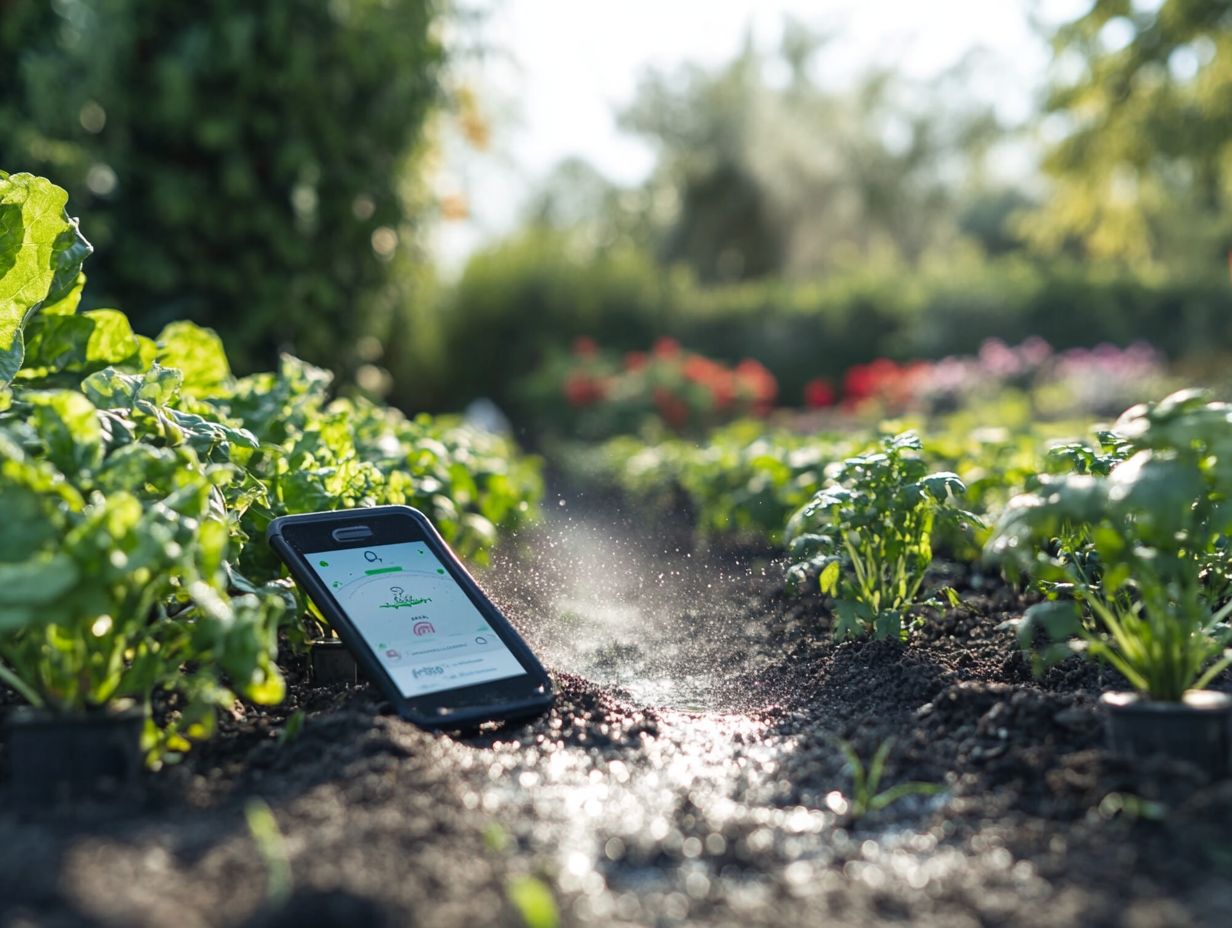
Smart irrigation systems equipped with advanced soil moisture sensors are vital for monitoring moisture levels in the soil. This ensures your plants receive the right amount of water to thrive and prevents over-irrigation.
These sensors detect the moisture content in the soil and relay real-time data to your irrigation system. This allows it to adjust watering schedules with precision.
Leverage this technology to make informed decisions that promote optimal plant health while minimizing water waste and enhancing growth.
It s crucial to prioritize regular maintenance of these irrigation systems. Worn components or clogged filters can compromise their efficiency. Routine checks help maintain the accuracy of moisture readings and ensure that your entire setup operates seamlessly, ultimately supporting robust plant vitality and creating flourishing gardens.
5. Integrates with Weather Data for Optimal Watering
Integrating weather data with your smart irrigation system elevates its effectiveness, allowing you to make optimal watering decisions that consider current weather conditions. This not only improves water management but also promotes environmental sustainability.
By analyzing weather patterns in real-time, your system can automatically adjust watering schedules, conserving water during droughts or postponing irrigation after rain. This ensures your plants receive just the right amount of moisture without waste or worry.
This intelligent approach conserves vital water resources while helping to mitigate soil erosion. Excess water can wash away essential fertile soil, leading to degradation, making it crucial to maintain appropriate moisture levels in your soil.
This practice reduces the likelihood of plant diseases, promotes healthier landscapes, and supports biodiversity.
Through this innovative use of technology, integrating weather data into your irrigation practices represents a significant leap toward sustainable agriculture.
What Is a Smart Irrigation System and How Does It Work?
A smart irrigation system represents the pinnacle of irrigation technology, elegantly combining automated convenience with eco-friendly practices to optimize your water usage.
By harnessing advanced sensors and technologies that collect and analyze information about weather and soil, these systems ensure efficient watering for both residential and commercial settings.
Equipped with various sensors, they measure soil moisture levels, temperature, and even rainfall. This allows for real-time adjustments to your watering schedules.
With the help of intelligent controllers, these systems seamlessly connect with weather forecasts. This ensures your plants receive just the right amount of water based on current conditions.
By prioritizing plant health through tailored irrigation strategies, you can significantly reduce water waste and maintenance costs, making this a sustainable choice for landscape management.
Smart irrigation not only saves valuable resources but also transforms your green spaces into thriving, lush environments.
What Are the Different Types of Smart Irrigation Systems?
Smart irrigation systems come in various types, such as drip irrigation, sprinkler systems, and advanced irrigation controllers. Each is meticulously designed to meet specific watering needs and maximize efficiency across diverse landscapes.
Understanding the distinctions between these systems is essential for selecting the right one for your particular setting. For example, drip irrigation is a fantastic choice for gardens or agricultural plots, delivering water directly to the root zones and significantly reducing evaporation.
Conversely, sprinkler systems might be better suited for larger lawns or commercial landscapes, providing broader coverage. Advanced irrigation controllers take things a step further by offering weather-based adjustments and real-time monitoring, greatly enhancing water efficiency.
By incorporating these technologies into your residential or commercial property, you can cultivate healthier plants while conserving precious water resources.
How Can a Smart Irrigation System Benefit the Environment?
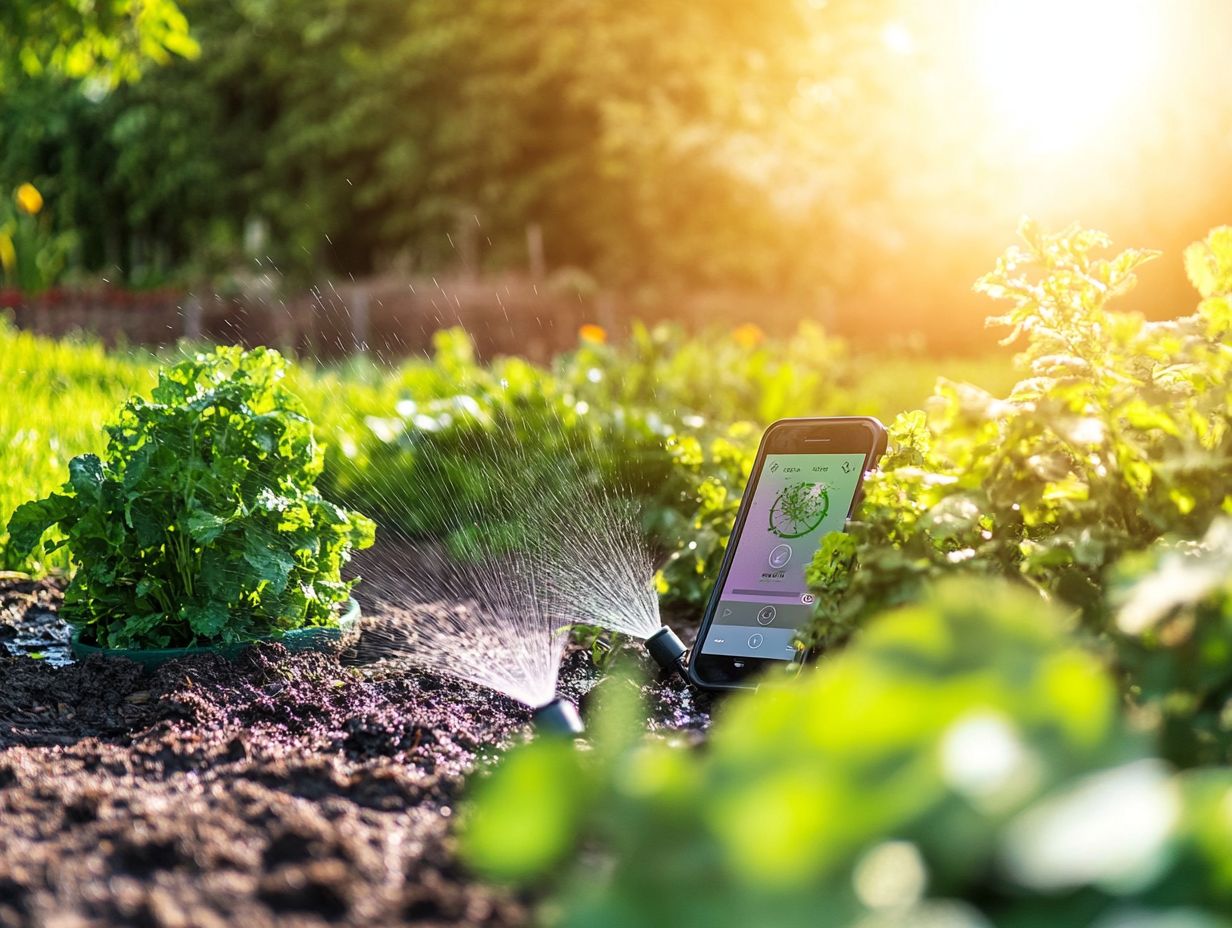
Implementing smart irrigation systems presents you with a host of environmental advantages. These include enhanced water conservation, reduced wastage, and effective erosion control. All these factors contribute to a more sustainable ecosystem.
By harnessing technologies like devices that measure how much water is in the soil and weather-based controllers, you can achieve precise water application that caters specifically to the needs of your plants.
For instance, consider a vineyard that embraced smart irrigation technologies. It dramatically reduced its water usage while simultaneously elevating grape quality through optimal moisture levels.
In urban landscaping, imagine a park that deployed intelligent irrigation systems. This resulted in a remarkable 30% decrease in water consumption while keeping the greenery lush and vibrant.
These successful implementations underscore how smart irrigation practices not only lessen the environmental impact of landscaping and agriculture but also foster overall environmental sustainability through innovative technological solutions.
What Are the Initial Costs and Potential Savings of a Smart Irrigation System?
While the initial investment in smart irrigation systems might appear steep, the potential savings on water bills and maintenance often make it a wise financial decision in the long run.
By utilizing sensors and automated scheduling, you could reduce water usage by up to 30%. This leads to significant savings on your utility bills.
The choice between a drip or sprinkler system is crucial as it impacts both your upfront costs and long-term benefits. Installation expenses can vary, but many homeowners discover that reduced maintenance thanks to less wear and tear on equipment can offset these costs in just a few seasons.
Local climate, soil type, and specific crop requirements are vital for effective smart irrigation. Considering these factors can make a significant difference, making smart irrigation a compelling option for both residential and agricultural settings.
Start investing now to ensure lower water bills and a healthier garden for years to come!
How Can a Smart Irrigation System Help with Plant Health and Growth?
Smart irrigation systems elevate your garden’s health and vitality. They deliver precise, timely watering tailored to the unique needs of various plant species and environmental conditions.
These advanced systems employ sensors and algorithms to continuously monitor soil moisture levels. This ensures your plants receive just the right amount of water no more, no less. This precision eliminates the risk of overwatering, which can lead to root rot and other unfortunate issues.
Imagine integrating smart irrigation into your garden care for incredible results! You can cultivate a harmonious ecosystem where your plants thrive in synergy with their surroundings. This approach not only conserves water but also fosters healthier soil and encourages vigorous growth.
As a result, you’ll have a stunning and sustainable garden that flourishes beautifully year after year.
What Are the Common Features of a Smart Irrigation System?
Common features of smart irrigation systems include advanced sensors, automated controllers, and the ability to connect with weather data. All of these enhance the convenience and efficiency of your watering routines.
These elements work together seamlessly to optimize water usage. They ensure that your gardens and landscapes receive precisely the right amount of irrigation based on real-time conditions.
The sensors diligently monitor soil moisture levels, sending signals to the automated controllers, which then adjust your watering schedule accordingly.
By incorporating weather data, these systems can anticipate rain or temperature shifts, effectively reducing unnecessary water consumption. Additional features like app connectivity allow you to manage your systems remotely, providing greater flexibility and peace of mind.
Ultimately, smart irrigation systems signify a substantial advancement toward sustainable gardening and efficient water management, enabling you to cultivate your outdoor spaces with confidence.
Frequently Asked Questions
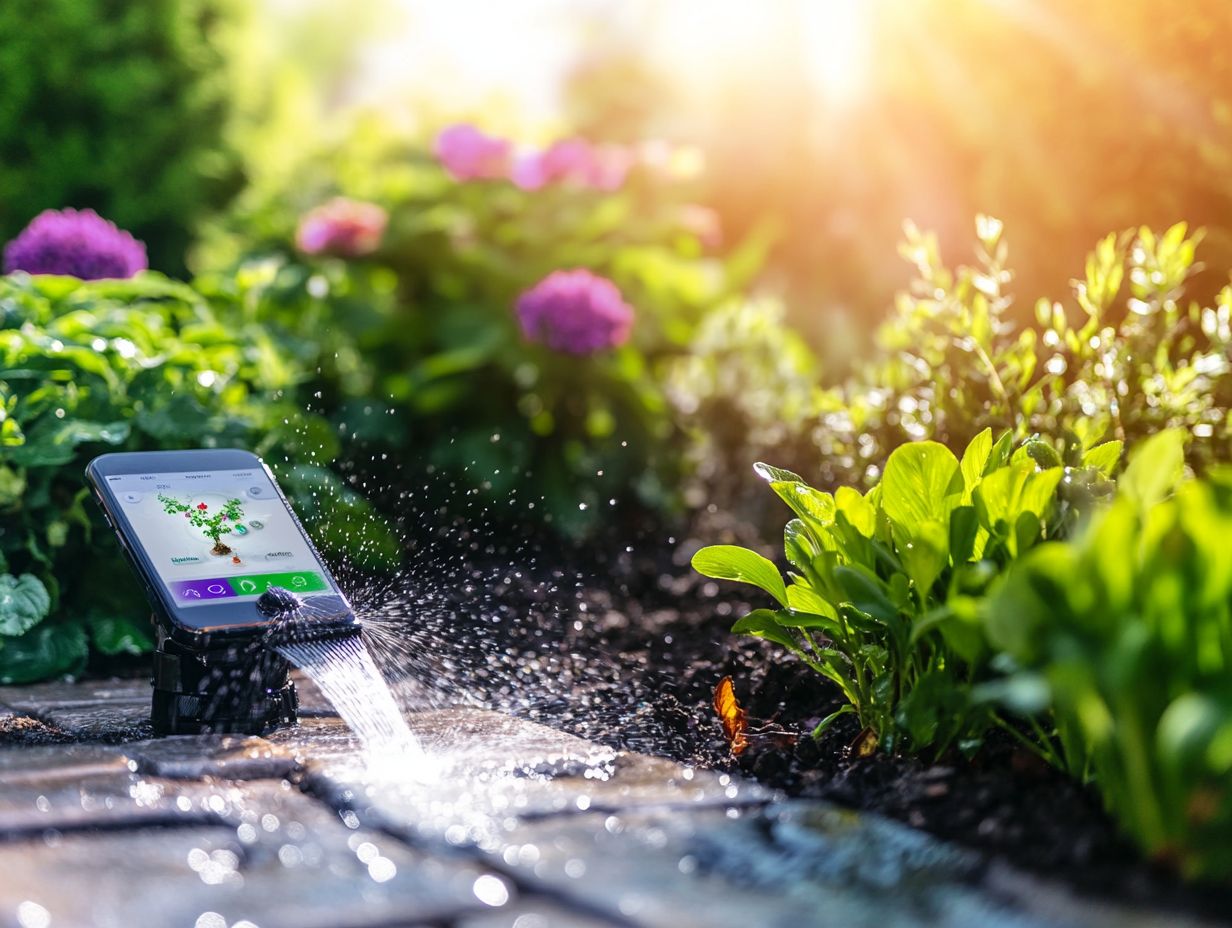
What exactly is a smart irrigation system?
A smart irrigation system automates the watering of your plants and lawn. It uses sensors and weather data to ensure your plants get just the right amount of water.
What are the benefits of investing in a smart irrigation system?
Investing in a smart irrigation system offers great advantages. It saves water, lowers bills, and keeps your garden healthy!
How does a smart irrigation system reduce water usage?
This system uses sensors to know exactly how much water your landscape needs. This means no more overwatering and significant savings on water usage.
Will investing in a smart irrigation system really save me money?
Absolutely! It decreases your water bills and helps prevent expensive landscape damage from overwatering.
Can I control a smart irrigation system from my phone?
Yes! Most systems offer a mobile app, so you can monitor and adjust your watering from anywhere.
Is a smart irrigation system suitable for all types of landscapes?
Definitely! Smart irrigation systems can be customized to fit any landscape, whether it s a cozy yard or a sprawling commercial property.

